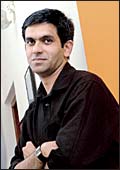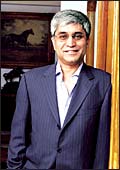|
Your
visiting card says managing director or a similar fancy designation;
your annual salary is in eight figures, or at least in the high
seven figures; and your name-and, maybe, photograph-has appeared
a few times in magazines such as this one. In short, you've been
there, done that and arrived in life. Then what? You could, of
course, carry on doing the same thing. Or, like many successful
professionals, you could say: "I've created wealth for others
all my life; it's time to do the same for myself."
Says Munesh Khanna, who quit as Managing
Director of N.M. Rothschild India in January this year and joined
Enam Financial Consultants as partner and Managing Director: "People
are peaking much earlier than before; you'll find several relatively
young men and women in leadership positions at many organisations.
Some of them don't want to carry on doing the same thing for the
rest of their lives." Hence, the desire to turn entrepreneur.
Accessing money has also become a lot easier than before. "If
you have a great idea, people will put money on you," says
Khanna, adding that he moved to Enam with an equity interest as
it "offers a wider canvas and provides greater opportunities
for creativity and entrepreneurship". He had to take a pay
cut, but Khanna doesn't mind. His equity interest will ensure
his gains over the long term.
There are many others like Khanna who have
parleyed their experience, brand equity and, sometimes, savings
into ownership positions at firms they either founded or joined
after quitting their regular salaried jobs.
Michael Foley, proprietor of Foley Designs,
started his career at Titan as a designer trainee in 2000 and
rose to become its Chief Creative Associate within five years;
last year, he set up Titan's much-lauded Design Studio. Then,
he quit in December to start out on his own because he realised
that India Inc is just beginning to recognise the importance of
design and the impact it has on consumers. "This is the right
time to start," he says. "Clients now approach me to
design their products from a more holistic perspective. Their
briefs do not pin point any particular aspect and I have a free
hand in structuring the entire concept," says Foley, who
won BT's Ideator of the Year Award in 2005. Promoting his own
venture has involved a lot of financial sacrifice as he had to
make major investments in manpower and software and also forego
an assured salary. Now, Foley is looking to raise Rs 3 crore through
the venture capital route. He expects to break even and rake in
profits in another 6-7 months. Foley also plans to open a Concept
Design Studio, which will proactively approach clients with design
ideas rather than wait for them to come to him. Turning entrepreneur
gives him the freedom to experiment with new things, but he still
sometimes misses Titan. "There is so much you can learn from
a professional organisation that you cannot on your own,"
he says.
CHASING THEIR DREAMS
Five reasons why people are leaving
high-salary jobs to start out on their own: |
CHANGING SOCIAL MORES
Wealth creation is now considered a totally respectable pursuit
GREATER OPPORTUNITIES
Talented professionals can monetise their corporate
experience more easily nowadays
REDUCED RISKS
There are plenty of jobs available if the venture does
not work out
NEED FOR FREEDOM
Being one's own boss, and getting rich in the process,
is the ultimate dream of most pros
EASIER AVAILABILITY OF CAPITAL
For talented and proven individuals, money is there
for the asking
|
Narayan K. Seshadri, former Managing Director,
Consulting, KPMG India, agrees. "Large organisations, with
well-greased infrastructures and processes and established brand
names definitely make work that much easier." Then why did
he leave? There were personal reasons. "I also wanted to
capitalise on the opportunity for creating wealth by helping turn
around distressed companies; the returns here are much higher,"
he says. That apart, being independent means getting the freedom
to experiment-a big attraction for most successful executives.
"The flip side of working for a large company is the procedural
straitjacket it puts you in. But here, we set the boundaries and
limitations," he says. Seshadri's firm, Halcyon Resources
& Management, which he set up in 2004, is currently working
on five corporate turnarounds. In particular, he mentions Baroda
Raymond Corporation, which he helped turn around in one-and-a-half
years. Besides, "I like to help small entrepreneurs,"
he adds.
 |
 |
Name: Michael Foley, 35
Education: Professional Education Program from NID, Ahmedabad,
with specialisation in Industrial Design
Last Job: Chief Creative Associate at Titan
Last Salary: N.A.
Driven by:
"Personal excitement in designing." |
Name: Narayan Seshadri,
48
Education: CA
Last Job: Managing Director, KPMG Consulting
Last Salary: Over Rs 1 crore p.a.
Driven By: "The huge opportunity and independence to
do what I wanted to do." |
Sudhindra Hangal, an alumnus of IIT, Delhi
and Stanford University, is yet another member of this burgeoning
tribe of professionals-turned-entrpreneurs. A software architect
(who designs a software package from the ground up and doesn't
just write code), he was one among only a dozen such people at
Sun Microsystems' India Engineering Center and a respected authority
in the geeky fields of Java and j2ee. In September 2005, he decided
that he had had enough of working for others. Result: he set up
Magic Lamp Software at the incubation centre of the Indian Institute
of Management, Bangalore, in association with a colleague from
Sun. "Due to lower costs, the financial risks of starting
a company here are much lower than in Silicon Valley, which has,
until now, been the centre of most it innovations. Services, rather
than products, are the focus of most Indian firms. I want to change
this by working on cutting edge innovation in the area of software
quality," says Hangal, who had to sacrifice the very comfortable
salary his position as a senior staff engineer (the highest grade
for technical talent at Sun) gave him. "I had gone as far
as I could with Sun and wanted to branch out on my own. Magic
Lamp is still finding its feet, so neither Sanjeev (Krishnan,
co-founder) nor I have a steady salary like we used to. But we've
both worked for a while and so, are financially stable,"
he adds.
 |
Name: Sudhindra Hangal, 35
Education: BE, IIT Delhi; MS, Stanford University
Last Job: Senior Staff Engineer, Sun Microsystems
Last Salary: N.A.
Driven by: "The urge to strike out on my own and work
independently." |
What happens if the venture doesn't work out?
Says Foley: "One can always go back to the corporate world;
there are jobs aplenty." Girish Rangan, former Managing Director
of transaction management firm, Venture Infotek-Global, who started
his own management consultancy practice two years ago, did just
that. Three weeks ago, he wound up his private enterprise and
went back to a salaried job. He is currently Country Manager for
India, Universitas 21 Global, an online university based in Singapore
which specialises in providing executive management cour ses for
corporate executives. Says Rangan: "The corporate environment
is characterised by buzz, deadlines and reviews. This is often
missing in independent businesses; the space between personal
life and work also gets blurred." Seshadri agrees with this
assessment. "When I started out on my own, my main objective
was to spend more time at home. However, exactly the opposite
has occurred," he laughs. One reason for that is that newly
established private ventures need lots of luck and perseverance
to succeed. And proving the adage that luck always seems to favour
the person who perseveres the most, Seshadri adds: "With
effort there are always returns." True. But the best part
of the deal is that if the expected returns don't materialise,
one can always shrug off the experience as a bad day in office
and get right back into the corporate rat race. But in a sign
that this trend of self-employed wealth creators is here to stay,
even fresh B-school grads are turning down lucrative job offers
to start out on their own. And they don't even have the cushion
of large savings and years of experience. Entrepreneurship as
a career option has arrived at last in the country.
COUNSELLING
Help, Tarun!
 I am a 30-year-old High Court lawyer, specialising in accounts
and taxation cases. I also have an M.Com degree and done a basic
accounting course in computers. Our financial position is precarious.
Please advise which area should I focus on to become financially
secure.
I am a 30-year-old High Court lawyer, specialising in accounts
and taxation cases. I also have an M.Com degree and done a basic
accounting course in computers. Our financial position is precarious.
Please advise which area should I focus on to become financially
secure.
I don't know what kind of cases you are getting, so I can't advise
you on specifics. However, if you want to remain independent,
you could concentrate on sales tax or excise cases. If financial
security is your most pressing need, you could take up a job with
an accounting firm specialising in taxes or a company in its accounting/tax
department.
I am a 25-year-old banker with an MBA
(Marketing). I've been carrying out experiments in the bio-diesel
field for the last few years. I have also gone to three-four research
organisations. Do I have a future if I decide to devote myself
full time to producing an alternative fuel?
You can continue experimenting on the side,
if you don't want to risk your financial security. If you make
a breakthrough, you can always get funding at that point. However,
if you want to do this full time, following are your options.
If the experiments look promising, get venture capital, or join
a company engaged in the same field.
Answers to your career concerns are contributed
by Tarun Sheth (Senior Consultant) and Shilpa Sheth (Managing
Partner, US practice) of HR firm, Shilputsi Consultants. Write
to Help,Tarun! c/o Business Today, Videocon Tower, Fifth Floor,
E-1, Jhandewalan Extn., New Delhi-110055..
Wanted:
Gurus In Corporate Advice
Large and small consultancy firms are hiring
CAs and MBAs by the thousands
The booming economy
is throwing up job opportunities for consultants. Says Sumeet
Mathur, Director, Human Resource, KPMG: "We plan to recruit
about 5,000 people by 2010." A majority of them will be CAS
and MBAs in the 24-35 age group. The story is much the same at
other consultancy majors. "I'll recruit 100 people right
away if I get the right people," adds Rahul Roy, Executive
Director, Ernst & Young. "There's huge demand for both
top end 'brain surgery' work as well as grunt work," informs
Mohit Mohan, VP of executive search firm Gilbert Tweed Associates.
PWC and McKinsey & Company declined to reveal their numbers,
but market sources say they, too, are hiring big. Smaller and
niche consulting firms are adding to their headcount as well.
Adds Arun Mahapatra, Managing Partner, Heidrick & Struggles:
"This trend will continue for at least another 2-3 years."
-Manu Kaushik and Kapil Bajaj
|








 I am a 30-year-old High Court lawyer, specialising in accounts
and taxation cases. I also have an M.Com degree and done a basic
accounting course in computers. Our financial position is precarious.
Please advise which area should I focus on to become financially
secure.
I am a 30-year-old High Court lawyer, specialising in accounts
and taxation cases. I also have an M.Com degree and done a basic
accounting course in computers. Our financial position is precarious.
Please advise which area should I focus on to become financially
secure.